金融类翻译文章 英译中
金融英语翻译范文

金融英语翻译范文China raises interest rates to slow inflationThe People's Bank of China, the central bank, raised key savings and lending interest rates from Sunday, March 18, the third time in 11 months in a bid to curb inflation and asset bubbles in the world's fastest-growing major economy. The one-year benchmark lending rate will be raised to 6.39 percent from 6.12 percent, and the one-year deposit rate will be increased to 2.79 percent from 2.52 percent, according to a statement on the bank's website () .Central bank Governor Zhou Xiao chuan is concerned that cash from a record trade surplus is stoking excess investment, raising the risk of accelerating inflation and boom-and-bust cycles in asset prices. Zhou has resisted calls from Europe and the US to let the Yuan strengthen at a faster pace, making China's exports more expensive.The central bank said, said in a statement posted on its website, that this interest rates adjustment will be conducive to the rational growth of credit and investment; conducive to maintaining a stable price level; conducive to the steady operation of the financial system; conducive to the balanced economic growth and structural optimization, and conducive to promoting sound and fast growth of the national economy."The data released in the past week suggests that the economy is not actually slowing and that the government is becoming quiteconcerned that the economy is disproportionally driven by investment and production," Glenn Maguire, chief Asia economist at Societe Generale SA in Hong Kong, said. "The central bank will probably raise interest rates again two more times this year," Maguire said.Fixed-asset investment in urban areas climbed 23.4 percent in the first two months, down from 24.5 percent for all of 2006. China still must act to slow investment, Ma Kai, head of the National Development and Reform Commission, the country's top planning body, said last week.中国提高利率是为了减缓通货膨胀的压力为了努力控制世界发展最快的大国经济的通货膨胀和经济泡沫,中国人民银行即中央银行,从星期日(3月18日)开始在11个月中第三次提高储蓄和借款利率。
金融体系中英文对照外文翻译文献

金融体系中英文对照外文翻译文献(文档含英文原文和中文翻译)Comparative Financial Systems1 What is a Financial System?The purpose of a financial system is to channel funds from agents with surpluses to agents with deficits. In the traditional literature there have be en two approaches to analyzing this process. The first is to consider how agents interact through financial markets. The second looks at the operation offinancial intermediaries such as banks and insurance companies. Fifty years ago, the financial system co uld be neatly bifurcated in this way. Rich house-holds and large firms used the equity and bond markets,while less wealthy house-holds and medium and small firms used banks, insurance companies and other financial institutions. Table 1, for example, shows the ownership of corporate equities in 1950. Households owned over 90 percent. By 2000 it can be seen that the situation had changed dramatically.By then households held less than 40 percent, nonbank intermediaries, primarily pension funds and mutual funds, held over 40 percent. This change illustrates why it is no longer possible to consider the role of financial markets and financial institutions separately. Rather than intermediating directly between households and firms, financial institutions have increasingly come to intermediate between households and markets, on the one hand, and between firms and markets,on the other. This makes it necessary to consider the financial system as anirreducible whole.The notion that a financial system transfers resources between households and firms is, of course, a simplification. Governments usually play a significant role in the financial system. They are major borrowers, particularlyduring times of war, recession, or when large infrastructure projects are being undertaken. They sometimes also save significant amounts of funds. For example, when countries such as Norway and many Middle Eastern States have access to large amounts of natural resources (oil), the government may acquire large trust funds on behalf of the population.In addition to their roles as borrowers or savers, governments usually playa number of other important roles. Central banks typically issue fiat money and are extensively involved in the payments system. Financial systems with unregulated markets and intermediaries, such as the US in the late nineteenth century, often experience financial crises.The desire to eliminate these crises led many governments to intervene in a significant way in the financial system. Central banks or some other regulatory authority are charged with regulating the banking system and other intermediaries, such as insurance companies. So in most countries governments play an important role in the operation of financialsystems. This intervention means that the political system, which determines the government and its policies, is also relevant for the financial system.There are some historical instances where financial markets and institutions have operated in the absence of a well-defined legal system, relyinginstead on reputation and other im plicit mechanisms. However, in most financial systems the law plays an important role. It determines what kinds ofcontracts are feasible, what kinds of governance mechanisms can be used for corporations, the restrictions that can be placed on securities and so forth. Hence, the legal system is an important component of a financial system.A financial system is much more than all of this, however. An important pre-requisite of the ability to write contracts and enforce rights of various kinds is a system of accounting. In addition to allowing contracts to be written, an accounting system allows investors to value a company more easily and to assess how much it would be prudent to lend to it. Accounting information is only one type of information (albeit the most important) required by financial systems. The incentives to generate and disseminate information are crucial features of a financial system.Without significant amounts of human capital it will not be possible for any of these components of a financial system to operate effectively. Well-trained lawyers, accountants and financial professionals such as bankers are crucial for an effective financial system, as the experience of Eastern Europe demonstrates.The literature on comparative financial systems is at an early stage. Our survey builds on previous overviews by Allen (1993), Allen and Gale (1995) and Thakor (1996). These overviews have focused on two sets of issues.(1)Normative: How effective are different types of financial system atvarious functions?(2) Positive: What drives the evolution of the financial system?The first set of issues is considered in Sections 2-6, which focus on issues of investment and saving, growth, risk sharing, information provision and corporate governance, respectively. Section 7 consider s the influence of law and politics on the financial system while Section 8 looks at the role financial crises have had in shaping the financial system. Section 9 contains concludingremarks.2 Investment and SavingOne of the primary purposes of the financial system is to allow savings to be invested in firms. In a series of important papers, Mayer (1988, 1990) documents how firms obtained funds and financed investment in a number of different countries. Table 2 shows the results from the most recent set of studies, based on data from 1970-1989, using Mayer’s methodology. The figures use data obtained from sources-and-uses-of-funds statements. For France, the data are from Bertero (1994), while for the US, UK, Japan and Germany they are from Corbett and Jenkinson (1996). It can be seen that internal finance is by far the most important source of funds in all countries.Bank finance is moderately important in most countries and particularly important in Japan and France. Bond finance is only important in the US and equity finance is either unimportant or negative (i.e., shares are being repurchased in aggregate) in all countries. Mayer’s studies and those using his methodology have had an important impact because they have raised the question of how important financial marke ts are in terms of providing funds for investment. It seems that, at least in the aggregate, equity markets are unimportant while bond markets are important only in the US. These findings contrast strongly with theemphasis on equity and bond markets in the traditional finance literature. Bank finance is important in all countries,but not as important as internal finance.Another perspective on how the financial system operates is obtained by looking at savings and the holding of financial assets. Table 3 shows t he relative importance of banks and markets in the US, UK, Japan, France and Germany. It can be seen that the US is at one extreme and Germany at the other. In the US, banks are relatively unimportant: the ratio of assets to GDP is only 53%, about a third the German ratio of 152%. On the other hand, the US ratio of equity market capitalization to GDP is 82%, three times the German ratio of 24%. Japan and the UK are interesting intermediate cases where banks and markets are both important. In France, banks are important and markets less so. The US and UK are often referred to as market-based systems while Germany, Japan and France are often referred to as bank-based systems. Table 4 shows the total portfolio allocation of assets ultimately owned by the household sector. In the US and UK, equity is a much more important component of household assets than in Japan,Germany and France. For cash and cash equivalents (which includes bank accounts), the reverse is true. Tables 3 and 4 provide an interesting contrast to Table 2. One would expect that, in the long run, household portfolios would reflect the financing patterns of firms. Since internal finance accrues to equity holders, one might expect that equity would be much more important in Japan, France and Germany. There are, of course, differences in the data sets underlying the different tables. For example, household portfolios consist of financial assets and exclude privately held firms, whereas the sources-and-uses-of-funds data include all firms. Nevertheless, it seem s unlikely that these differences could cause such huge discrepancies. It is puzzling that these different ways of viewing the financial system produce such radically different results.Another puzzle concerning internal versus external finance is the difference between the developed world and emerging countries. Although it is true for the US, UK, Japan, France, Germany and for most other developed countries that internal finance dominates external finance, this is not the case for emerging countries. Singh and Hamid (1992) and Singh (1995) show that, for a range of emerging economies, external finance is more important than internal finance. Moreover, equity is the most important financing instrument and dominates debt. This difference between the industrialized nations and the emerging countries has so far received little attention. There is a large theoretical literature on the operation of and rationale for internal capital markets. Internal capital markets differ from external capital markets because of asymmetric information, investment incentives, asset specificity, control rights, transaction costs or incomplete markets There has also been considerable debate on the relationship between liquidity and investment (see, for example, Fazzari, Hubbard and Petersen(1988), Hoshi, Kashyap and Scharfstein (1991))that the lender will not carry out the threat in practice, the incentive effect disappears. Although the lender’s behavior is now ex post optimal, both parties may be worse off ex ante.The time inconsistency of commitments that are optimal ex ante and suboptimal ex post is typical in contracting problems. The contract commits one to certain courses of action in order to influence the behavior of the other party. Then once that party’s behavior has been determined, the benefit of the commitment disappears and there is now an incentive to depart from it.Whatever agreements have been entered into are subject to revision because both parties can typically be made better offby “renegotiating” the original agreement. The possibility of renegotiation puts additional restrictions on the kind of contract or agreement that is feasible (we are referring here to the contract or agreement as executed, ratherthan the contract as originally written or conceived) and, to that extent, tends to reduce the welfare of both parties ex ante. Anything that gives the parties a greater power to commit themselves to the terms of the contract will, conversely, be welfare-enhancing.Dewatripont and Maskin (1995) (included as a chapter in this section) have suggested that financial markets have an advantage over financial intermediaries in maintaining commitments to refuse further funding. If the firm obtains its funding from the bond market, th en, in the event that it needs additional investment, it will have to go back to the bond market. Because the bonds are widely held, however, the firm will find it difficult to renegotiate with the bond holders. Apart from the transaction costs involved in negotiating with a large number of bond holders, there is a free-rider problem. Each bond holder would like to maintain his original claim over the returns to the project, while allowing the others to renegotiate their claims in order to finance the additional investment. The free-rider problem, which is often thought of as the curse of cooperative enterprises, turns out to be a virtue in disguise when it comes to maintaining commitments.From a theoretical point of view, there are many ways of maintaining a commitment. Financial institutions may develop a valuable reputation for maintaining commitments. In any one case, it is worth incurring the small cost of a sub-optimal action in order to maintain the value of the reputation. Incomplete information about the borrower’s type may lead to a similar outcome. If default causes the institution to change its beliefs about the defaulter’s type, then it may be optimal to refuse to deal with a firm after it has defaulted. Institutional strategies such as delegating decisions to agents who are given no discretion to renegotiate may also be an effective commitment device.Several authors have argued that, under certain circumstances, renegotiation is welfare-improving. In that case, the Dewatripont-Maskin argument is turned on its head. Intermediaries that establish long-term relationships with clients may have an advantage over financial markets precisely because it is easier for them to renegotiate contracts.The crucial assumption is that contracts are incomplete. Because of the high transaction costs of writing complete contracts, some potentially Pareto-improving contingencies are left out of contracts and securities. This incompleteness of contracts may make renegotiation desirable. The missing contingencies can be replaced by contract adjustments that are negotiated by the parties ex post, after they observe the realization of variables on which the contingencies would have been based. The incomplete contract determines the status quo for the ex post bargaining game (i.e., renegotiation)that determines the final outcome.An import ant question in this whole area is “How important are these relationships empirically?” Here there does not seem to be a lot of evidence.As far as the importance of renegotiation in the sense of Dewatripont and Maskin (1995), the work of Asquith, Gertner and Scharfstein (1994) suggests that little renegotiation occurs in the case of financially distressed firms.Conventional wisdom holds that banks are so well secured that they can and do “pull the plug” as soon as a borrower becomes distressed, leaving theunsecured creditors and other claimants holding the bag.Petersen and Rajan (1994) suggest that firms that have a longer relationship with a bank do have greater access to credit, controlling for a number of features of the borrowers’ history. It is not clea r from their work exactly what lies behind the value of the relationship. For example, the increased access to credit could be an incentive device or it could be the result ofgreater information or the relationship itself could make the borrower more credit worthy. Berger and Udell (1992) find that banks smooth loan rates in response to interest rate shocks. Petersen and Rajan (1995) and Berlin and Mester (1997) find that smoothing occurs as a firm’s credit risk changes.Berlin and Mester (1998) find that loan rate smoothing is associated with lower bank profits. They argue that this suggests the smoothing does not arise as part of an optimal relationship.This section has pointed to a number of issues for future research.• What is the relationship between th e sources of funds for investment,as revealed by Mayer (1988, 1990), and the portfolio choices of investorsand institutions? The answer to this question may shed some light onthe relative importance of external and internal finance.• Why are financing patterns so different in developing and developedeconomies?• What is the empirical importance of long-term relationships? Is renegotiationimportant is it a good thing or a bad thing?• Do long-term relationships constitute an important advantage of bankbasedsystems over market-based systems?金融体系的比较1、什么是金融体系?一个金融系统的目的(作用)是将资金从盈余者(机构)向短缺者(机构)转移(输送)。
金融英语翻译 - 排序
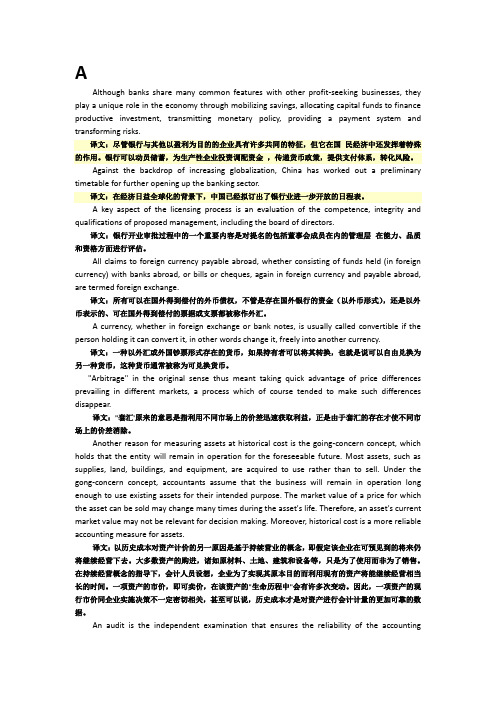
AAlthough banks share many common features with other profit-seeking businesses, they play a unique role in the economy through mobilizing savings, allocating capital funds to finance productive investment, transmitting monetary policy, providing a payment system and transforming risks.译文:尽管银行与其他以盈利为目的的企业具有许多共同的特征,但它在国民经济中还发挥着特殊的作用。
银行可以动员储蓄,为生产性企业投资调配资金,传递货币政策,提供支付体系,转化风险。
Against the backdrop of increasing globalization, China has worked out a preliminary timetable for further opening up the banking sector.译文:在经济日益全球化的背景下,中国已经拟订出了银行业进一步开放的日程表。
A key aspect of the licensing process is an evaluation of the competence, integrity and qualifications of proposed management, including the board of directors.译文:银行开业审批过程中的一个重要内容是对提名的包括董事会成员在内的管理层在能力、品质和资格方面进行评估。
All claims to foreign currency payable abroad, whether consisting of funds held (in foreign currency) with banks abroad, or bills or cheques, again in foreign currency and payable abroad, are termed foreign exchange.译文:所有可以在国外得到偿付的外币债权,不管是存在国外银行的资金(以外币形式),还是以外币表示的、可在国外得到偿付的票据或支票都被称作外汇。
金融英语双语阅读三篇
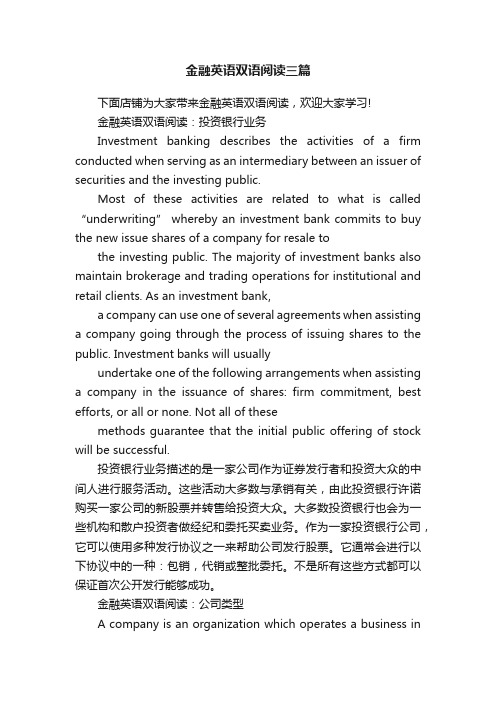
金融英语双语阅读三篇下面店铺为大家带来金融英语双语阅读,欢迎大家学习!金融英语双语阅读:投资银行业务Investment banking describes the activities of a firm conducted when serving as an intermediary between an issuer of securities and the investing public.Most of these activities are related to what is called “underwriting” whereby an investment bank commits to buy the new issue shares of a company for resale tothe investing public. The majority of investment banks also maintain brokerage and trading operations for institutional and retail clients. As an investment bank,a company can use one of several agreements when assisting a company going through the process of issuing shares to the public. Investment banks will usuallyundertake one of the following arrangements when assisting a company in the issuance of shares: firm commitment, best efforts, or all or none. Not all of thesemethods guarantee that the initial public offering of stock will be successful.投资银行业务描述的是一家公司作为证券发行者和投资大众的中间人进行服务活动。
金融概括的英文作文带翻译

金融概括的英文作文带翻译对于金融这个话题,我有很多想法。
金融是一个非常广泛的领域,涵盖了许多不同的方面,比如投资、银行、保险等等。
在日常生活中,我们经常会接触到金融,比如存款、贷款、股票投资等等。
"英文,"When it comes to the topic of finance, I have a lot of thoughts. Finance is a very broad field, covering many different aspects such as investments, banking, insurance, and so on. In our daily lives, we often comeinto contact with finance, such as savings, loans, stock investments, and so on."中文,"金融这个话题,我有很多想法。
金融是一个非常广泛的领域,涵盖了许多不同的方面,比如投资、银行、保险等等。
在日常生活中,我们经常会接触到金融,比如存款、贷款、股票投资等等。
I believe that understanding the basics of finance is crucial for everyone. For example, knowing how to budgetand save money is important for individuals and families.It's also important to understand the different types of loans and how they work. For instance, when I was in college, I took out a student loan to help pay for my tuition. I had to learn about interest rates, repayment plans, and the impact of taking on debt."英文,"我相信,理解金融的基础知识对每个人都很重要。
金融文章中英文对照

金融文章中英文对照在现代市场经济中,金融的地位越来越突出,起着很重要的作用。
下面是店铺为大家带来了中英文对照的金融文章,欢迎大海阅读!金融文章中英文对照篇1金融时报双语阅读China should let its currency rise. Such has been the desperate, decade-long complaint from the US and its politicians. China’s manipulation of its currency is a popular scapegoat both for the financial crisis and for the extinction of US manufacturing.An appreciation is plainly in China’s urgent interests. And the rest of the world, including the US, is beginning to grasp that it has reason to fear the consequences if it does. On Wednesday and Thursday of this week, China’s authorities at one point allowed the renminbi to appreciate against the dollar by a greater percentage than in any two-day period since its managed rise first started in 2005. These moves remain tiny; but they combine with official criticism of the US, a growing need to combat Chinese inflation and much Chinese commentary favouring a change of policy to suggest that the renminbi may soon be allowed to take flight. A widening of its trading bands might be a first incremental step.Unlike the first managed appreciation, from 2005 to 2008, the current “appreciation” has done nothing to help domestic inflation. By tying to the dollar, a currency sinking like a stone, the renminbi has depreciated against all currencies on a trade-weighted basis, JPMorgan data show. A drastic shift is needed. That will mean exporting its inflation. It also means buying fewer treasuries, or even selling some, which would in turn counteractany efforts at “quantitative easing” – buying bonds to keep US yields low.The dollar would probably tumble, and treasury yields rise. Other effects are less clear. The Australian dollar, long a proxy for Chinese growth, might suffer if China slows, as might other commodity-driven currencies but much depends on China’s own decisions.China’s external reserves are enough, even at current prices, to buy all the gold ever produced. It will be hard to shift policy without causing a big displacement elsewhere in the world. Correcting this global imbalance may be necessary but it will not be easy.Lex专栏:美国担心人民币升值?中国应该让人民币升值——美国及其政界人士为此声嘶力竭地抱怨了10年。
金融英语学习资料 中英文对照

Bitcoin has bounced back in China, helping to push the virtual currency back above $1,000 a unit, as exchanges devise workaround solutions to the regulatory crackdown last month.比特币在中国展开反弹,推动这种虚拟货币的单价重返1000美元上方。
针对监管机构上月出台的打击措施,各交易所拿出了变通办法。
When Chinese regulators banned financial institutions from doing business with Bitcoin exchanges last month, the move was thought by many to spell the end for the virtual currency in China. Would-be buyers were told they would no longer be able to transfer cash on to exchanges via digital payment platforms, in effect making it impossible tobuy Bitcoins.中国监管机构上月禁止金融机构经手比特币交易所的业务后,很多人以为此举标志着这种虚拟货币在中国的前途已被画上句号。
潜在买家被告知,他们将不再能够通过数字支付平台向交易所转移资金,这实际上使他们无法购买比特币。
“In the darkest hours we thought everything was going to come crashing down and the game was over,” said Bobby Lee, co-founder of BTC China, one of the country’s top exchanges.“在最黑暗的时刻,我们以为一切将要塌下来,游戏结束了,”中国最大的交易所之一“比特币中国”(BTC China)的联合创始人李启元(Bobby Lee)表示。
文档金融专业英语翻译

□英译汉1.For example pay ments facilities through banks convenient savings and access to home loans from building societies and car h ouse or life insurance. ——例如银行提供的付款工具、建房互助会或储贷协会提供便利储蓄和住房信贷以及汽车、房屋或人寿保险。
2.All these financial institutions and markets fit together into a network which comprises the financial system. ——所有的这些金融机构和金融市场会聚在一起交织成网便构成了金融体系。
1.By their very nature financial institutions attract criticism: bankers would not be doing their jobs if they did not turn down some requests for loans and those who are denied funds sometimes feel hard done by and are vociferous in their complaints. ——金融机构天生就容易招惹批评如果银行家不拒绝几份贷款请求那他就不是在认真工作而那些被拒绝了的借款人有时会觉得十分委屈甚至大为光火大叫大嚷抱怨不停。
2. It is the ultimate savers and ultimate borrowers who are as it were on the periphery of the financial system whose needs it serves provide the rationale for its existence. ——可以说最终储蓄者和最终借款人处于金融体系的最边缘金融体系为他们的需求服务他们是金融体系存在的最根本理由。
关于金融的英语作文带翻译
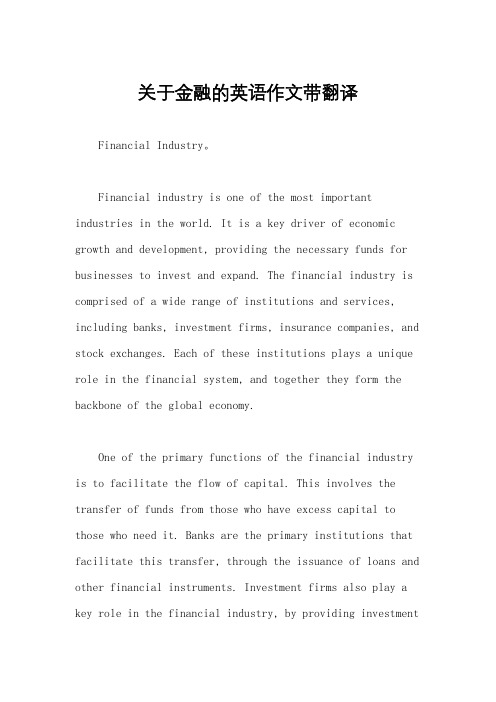
关于金融的英语作文带翻译Financial Industry。
Financial industry is one of the most important industries in the world. It is a key driver of economic growth and development, providing the necessary funds for businesses to invest and expand. The financial industry is comprised of a wide range of institutions and services, including banks, investment firms, insurance companies, and stock exchanges. Each of these institutions plays a unique role in the financial system, and together they form the backbone of the global economy.One of the primary functions of the financial industry is to facilitate the flow of capital. This involves the transfer of funds from those who have excess capital to those who need it. Banks are the primary institutions that facilitate this transfer, through the issuance of loans and other financial instruments. Investment firms also play a key role in the financial industry, by providing investmentopportunities for individuals and institutions. These firms manage investment portfolios on behalf of their clients, and help to diversify their investments across a range of asset classes.Insurance companies are another important component of the financial industry. They provide protection against financial losses due to unforeseen events, such as accidents, natural disasters, and illness. Insurance policies are designed to transfer risk from the policyholder to the insurance company, providing peace of mind and financial security.The stock market is also a critical component of the financial industry. It provides a platform for companies to raise capital by issuing shares of stock to investors. Investors can then buy and sell these shares on the open market, providing liquidity and price discovery. The stock market also provides a barometer of economic activity, reflecting the overall health of the economy and the performance of individual companies.In recent years, the financial industry has undergone significant changes and challenges. The global financial crisis of 2008 exposed weaknesses in the financial system, leading to increased regulation and oversight. The rise of financial technology, or fintech, has also disrupted traditional financial institutions by providing new ways of accessing financial services and products.Despite these challenges, the financial industry remains a critical component of the global economy. It plays a vital role in providing the necessary funds for businesses to grow and innovate, and in protecting individuals and institutions against financial risks. As the world becomes increasingly interconnected and complex, the financial industry will continue to evolve and adapt to meet the needs of a changing world.。
金融资产证券化中英文对照外文翻译文献
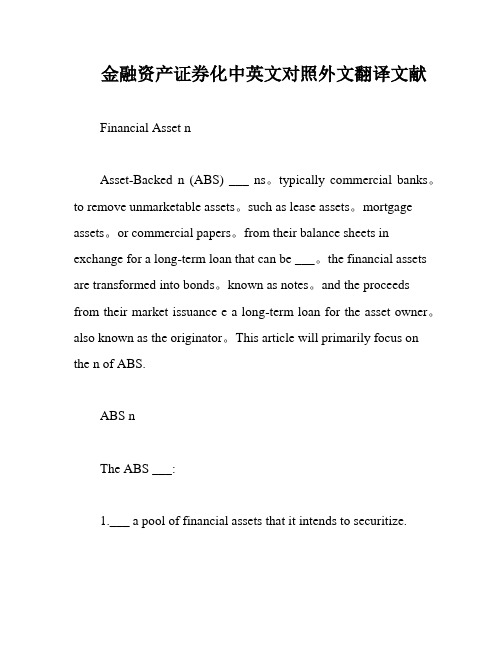
金融资产证券化中英文对照外文翻译文献Financial Asset nAsset-Backed n (ABS) ___ ns。
typically commercial banks。
to remove unmarketable assets。
such as lease assets。
mortgage assets。
or commercial papers。
from their balance sheets in exchange for a long-term loan that can be ___。
the financial assets are transformed into bonds。
known as notes。
and the proceeds from their market issuance e a long-term loan for the asset owner。
also known as the originator。
This article will primarily focus on the n of ABS.ABS nThe ABS ___:1.___ a pool of financial assets that it intends to securitize.2.___ of the assets to a special purpose vehicle (SPV)。
which is created for the sole purpose of holding the assets and issuing the notes.3.The SPV issues the notes。
which are backed by the cash flows generated by the underlying assets.4.The notes are sold to investors in the capital markets。
财经英语文章_财经类英语文章带翻译
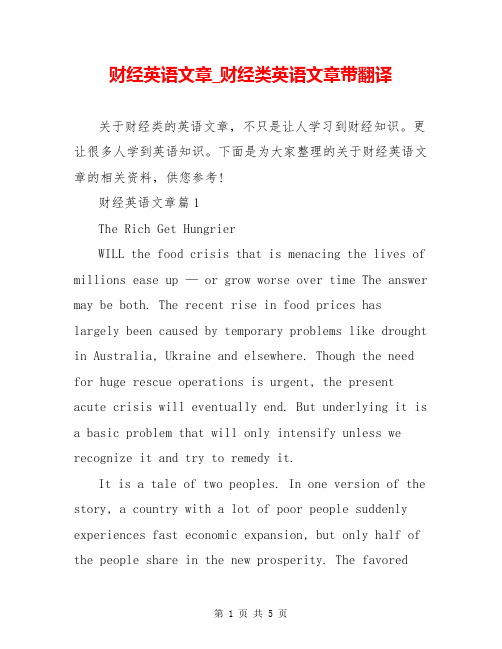
财经英语文章_财经类英语文章带翻译关于财经类的英语文章,不只是让人学习到财经知识。
更让很多人学到英语知识。
下面是为大家整理的关于财经英语文章的相关资料,供您参考!财经英语文章篇1The Rich Get HungrierWILL the food crisis that is menacing the lives of millions ease up — or grow worse over time The answer may be both. The recent rise in food prices haslargely been caused by temporary problems like drought in Australia, Ukraine and elsewhere. Though the need for huge rescue operations is urgent, the present acute crisis will eventually end. But underlying it is a basic problem that will only intensify unless we recognize it and try to remedy it.It is a tale of two peoples. In one version of the story, a country with a lot of poor people suddenly experiences fast economic expansion, but only half of the people share in the new prosperity. The favoredones spend a lot of their new income on food, and unless supply expands very quickly, prices shoot up. The rest of the poor now face higher food prices but no greater income, and begin to starve. Tragedies like this happen repeatedly in the world.财经英语文章篇2Developed and developing countries witnessed different rates of growth in mobile-phone subscription from 2000 to 20__. As the bar graph shows, the number of mobile-phone sub-scribers in developed countries rose steadily(稳步增长)from 0.7 billion in 2000 to one billion in 20__. Bystark contrast(突出对比), cell phone users in developing countries soared from 0.4 billion to 4 billion in the same period.What accounts for this disparity(差距,不同) The answer involves two factors. The first reason is technology gap. Developed countries generally enjoy advanced technology, which enables them to popularize mobile phone ahead of developing countries. Another contributing factor is the difference in population size. As we know, developed countries usually have asmall population but most developing countries a large. As the price of the mobile phone slides(下滑), moreand more people in developing countries avail themselves of(利用)this service, which explains thesubstantial increase(大幅增长)in mobile-phone subscription in these countries since 20__.From the case of mobile-phone subscription, we see that developing countries are quickly catching up(赶追)in science and technology, which is believed to be conducive to closing the gap between developing and developed countries.财经英语文章篇3China's currency “is no longer undervalued“, according to the International MonetaryFund (IMF).国际货币基金组织认为,人民币币值已不再被低估。
经济类文章英汉翻译
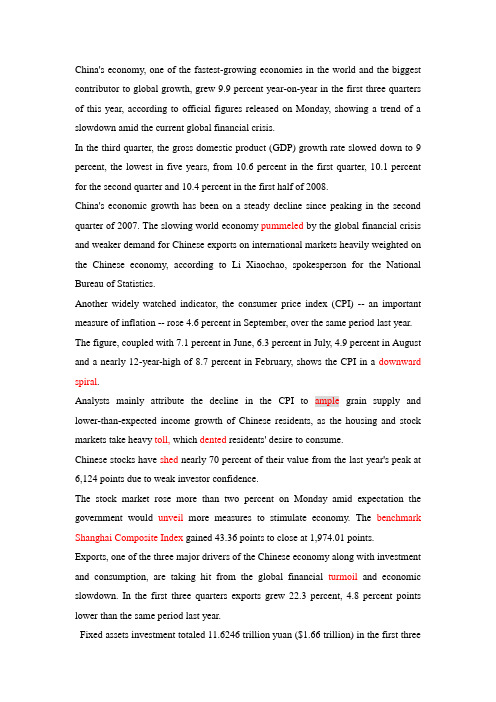
China's economy, one of the fastest-growing economies in the world and the biggest contributor to global growth, grew 9.9 percent year-on-year in the first three quarters of this year, according to official figures released on Monday, showing a trend of a slowdown amid the current global financial crisis.In the third quarter, the gross domestic product (GDP) growth rate slowed down to 9 percent, the lowest in five years, from 10.6 percent in the first quarter, 10.1 percent for the second quarter and 10.4 percent in the first half of 2008.China's economic growth has been on a steady decline since peaking in the second quarter of 2007. The slowing world economy pummeled by the global financial crisis and weaker demand for Chinese exports on international markets heavily weighted on the Chinese economy, according to Li Xiaochao, spokesperson for the National Bureau of Statistics.Another widely watched indicator, the consumer price index (CPI) -- an important measure of inflation -- rose 4.6 percent in September, over the same period last year. The figure, coupled with 7.1 percent in June, 6.3 percent in July, 4.9 percent in August and a nearly 12-year-high of 8.7 percent in February, shows the CPI in a downward spiral.Analysts mainly attribute the decline in the CPI to ample grain supply and lower-than-expected income growth of Chinese residents, as the housing and stock markets take heavy toll, which dented residents' desire to consume.Chinese stocks have shed nearly 70 percent of their value from the last year's peak at 6,124 points due to weak investor confidence.The stock market rose more than two percent on Monday amid expectation the government would unveil more measures to stimulate economy. The benchmark Shanghai Composite Index gained 43.36 points to close at 1,974.01 points. Exports, one of the three major drivers of the Chinese economy along with investment and consumption, are taking hit from the global financial turmoil and economic slowdown. In the first three quarters exports grew 22.3 percent, 4.8 percent points lower than the same period last year.Fixed assets investment totaled 11.6246 trillion yuan ($1.66 trillion) in the first threequarters of 2008, up 27.0 percent over the same period last year, according to the bureau.The growth rate was 0.7 percentage points higher than the first half of this year, or 1.3 percentage points higher than the year-earlier level.Another key economic indicator, retail sales, increased by 22 percent year-on-year in the first three quarters and climbed 23.2 percent in September alone. Analysts say China would have to further stimulate domestic consumption in order to push the economy forward amid an export slump."China still has huge potential and leeway to expand domestic consumption," Li said. The combination of an economic slowdown and easing inflation may give rise to louder calls for loosening the monetary policy and adopting a more proactive fiscal policy.Analysts expect more monetary easing, building on two cuts in interest rates and banks' required reserves since mid-September.The State Council said on Sunday China's economy can weather the effects of the global financial turmoil, but growth will decline as business profits and public revenues slow.In a statement at the end of an executive meeting presided by Premier Wen Jiabao, it said the global turmoil and economic instability will have a "gradual" effect on the country.It said China's economic growth will slow along with corporate profits and public revenues, and as capital markets continue to fluctuate."Unfavorable international factors and the serious natural disasters at home have not changed the basic growth situation of our country's economy," said the statement posted on a government website. "Our country's economic growth has the ability and vigor to resist risks."China must "adopt flexible and cautious macroeconomic policies" to maintain stable growth, the statement said.The State Council said that in the fourth quarter, China should focus on developing the rural economy, while striving to control inflation.中国经济是世界增长最快的经济之一,也是对全球经济增长的最大贡献者之一。
金融英语翻译范文29篇
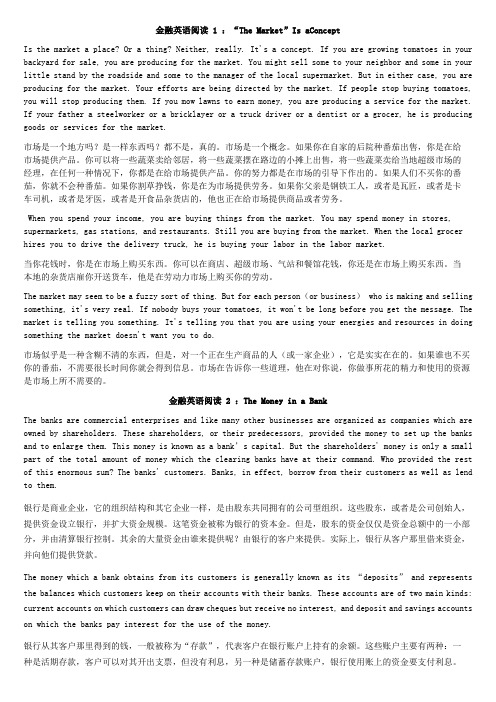
金融英语阅读 1 :“The Market”Is aConceptIs the market a place? Or a thing? Neither, really. It's a concept. If you are growing tomatoes in your backyard for sale, you are producing for the market. You might sell some to your neighbor and some in your little stand by the roadside and some to the manager of the local supermarket. But in either case, you are producing for the market. Your efforts are being directed by the market. If people stop buying tomatoes, you will stop producing them. If you mow lawns to earn money, you are producing a service for the market. If your father a steelworker or a bricklayer or a truck driver or a dentist or a grocer, he is producing goods or services for the market.市场是一个地方吗?是一样东西吗?都不是,真的。
市场是一个概念。
如果你在自家的后院种番茄出售,你是在给市场提供产品。
你可以将一些蔬菜卖给邻居,将一些蔬菜摆在路边的小摊上出售,将一些蔬菜卖给当地超级市场的经理,在任何一种情况下,你都是在给市场提供产品。
金融的英语作文带翻译
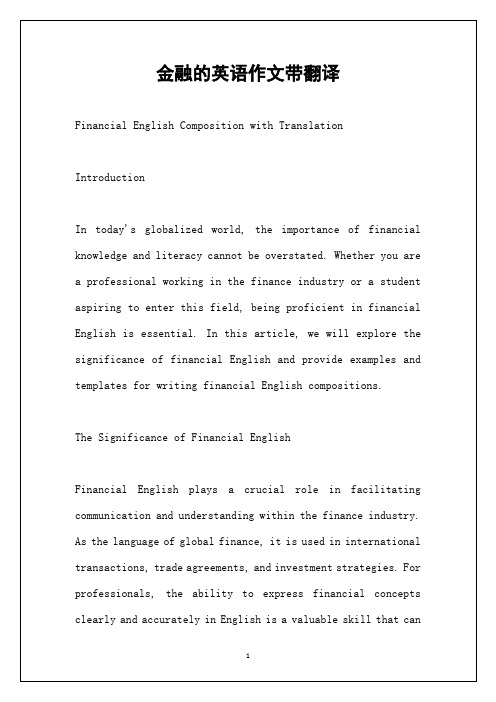
Body Paragraphs: Present key points, analysis, and supporting evidence.
The Significance of Financial English
Financial English plays a crucial role in facilitating communication and understanding within the finance industry. As the language of global finance, it is used in international transactions, trade agreements, and investment strategies. For professionals, the ability to express financial concepts clearly and accurately in English is a valuable skill that canenhance career opportunities and promote business success. Additionally, for students and researchers, mastering financial English is essential for accessing and understanding a wide range of academic literature and resources.
关于金融的英语小短文

关于金融的英语小短文金融——经济的心脏金融是现代社会不可或缺的重要组成部分。
它是经济的心脏,为全球经济提供了动力和血液。
简单来说,金融是对资金的管理和投资,它涵盖了各种各样的活动,包括银行、投资、保险、贸易等。
The world of finance is complex and dynamic, with various financial instruments and markets that facilitate global transactions and investments. For instance, stocks and bonds are common financial instruments that allow companies and governments to raise capital for various projects and operations. These instruments are traded on stock markets, which provide a platform for investors to buy and sell securities.Moreover, banking is another crucial component of the financial system. Banks serve as intermediaries between savers and borrowers, providing loans to individuals and businesses while offering savings accounts and other financial products to depositors. The banking system plays a vital role in promoting economic growth by channeling funds to productive investments and facilitating trade and commerce.In addition, the insurance industry is also an essential part of the financial sector. It provides a mechanism for individualsand businesses to manage risks and protect themselves against unexpected losses. By pooling risks, insurance companies can mitigate the financial impact of various shocks, such as natural disasters, accidents, or illnesses.Furthermore, the rise of digital technology has transformed the financial landscape in recent years. Financial technology, or Fintech, has emerged as a rapidly growing industry, offering innovative solutions and services that improve efficiency, accessibility, and inclusivity in financial systems. From mobile banking to cryptocurrencies, fintech has disrupted traditional financial models and provided new opportunities for individuals and businesses alike.However, with great power comes great responsibility. The financial sector must operate with transparency, integrity, and prudence to ensure stability and trust. Financial crises, such as the global recession of 2008, have demonstrated the far-reaching impact of the financial sector's mishaps on individuals, businesses, and entire economies. Therefore, effective regulation and oversight are essential to maintain a healthy financial system that serves the interests of all stakeholders.In conclusion, finance is the lifeblood of the global economy. It facilitates transactions, mobilizes resources, manages risks, and promotes growth. The diverse array of financial instruments, markets, and services are interwoven into a complex yet vital network that connects individuals, businesses, and nations. As the world continues to evolve, the financial sector must adapt and innovate to meet the changing needs and challenges while upholding the fundamentals of stability, transparency, and responsibility.。
常用的金融英语带翻译

常用的金融英语带翻译在日常生活中,我们能见到各种各样的英语,可见英语的使用范文很广。
小编在此献上金融英语,希望对大家有所帮助。
房地产行业话术:房屋贷款Al and Virginia Baxter are talking to their banker ,T ony Flora ,about a housing loan.艾尔和弗吉尼亚·巴克斯特正和他们的银行家托尼·费洛拉洽谈有关房屋贷款之事。
Al:We'd like to get some information about mortgage loans,Mr.Flora.艾尔:我们希望得到一些有关抵押贷款方面的知识,弗洛拉先生。
We found a house that we'd like to buy.我们找到了一所我们想买的房子。
Flora:Well,Mr.Baxter,we generally lend 80% of the bank's appraised value on 30-,35-or 40-year mortgages if the house is less than 10 years old .弗洛拉:好的,巴克斯特先生。
如果房屋从建成至今尚未超过10年,我们一般借给买房者的数额是银行对房屋估价的80%,而贷款期为30、35或40年。
Baxter:Oh ,it's almost a brand-new house .I think it was built two years ago .巴克斯特:哦,这几乎是一所全新的房子,我认为是两年前修建的。
A:Yes,it's a real good deal .The price is just right .艾尔:是的,这真是的桩合适的买卖,价钱也很合理。
F:Bank appraisals are usually slightly lower than the actual market prices,Mr.Baxter,弗洛拉,银行的估价总是低于实际市场价格的,巴克斯特先生。
经济金融英语中英对照翻译finance

祝大家英语学习进步!经济预测师们普遍预计,2010年将是经济温和增长的一年,增幅约为3%,大大好于此前两年。
The consensus of economic forecasters expects 2010 to be a year of modest e conomic growth -- almost 3% -- much better than the previous two years.但是,这还没有好到将失业率降到衰退前的水平。
而失业率一直是经济面临的最大持续性威胁。
But that's not good enough to bring unemployment -- the greatest continuing t hreat to the economy -- close to pre-recession levels.普遍预期在某些方面几乎总是有错误的;问题在于,经济会在哪些方面让我们出乎意料。
这在很大程度上取决于雇主将会招聘多少人。
The consensus is almost always wrong in some respect; the question is in whi ch respects the economy will surprise us. A lot rides on how much hiring em ployers do.以下是其它三大变数。
Here are three of the other big variables.企业投资即将反弹。
会吗?Business investment is primed to rebound. Will it?经济衰退对消费者支出的打击引来了企业更严重的下滑。
The pullback from consumers spooked by an economic downturn spurred an ev en sharper withdrawal by businesses.经济衰退期间的资本支出降幅超过了大萧条以来的任何时期。
金融学外文翻译3000汉字 中英对照

目录外文文献 (1)1. Introduction (1)2. Games and game theory (2)3. Theories of social preferences (3)4. Why do game experiments? And which games? (3)5. Conclusions (4)中文翻译 (4)1.摘要 (5)2.博弈和博弈论 (5)3.社会偏好理论 (6)4.为什么用博弈做实验?用什么博弈? (6)5. 结论 (6)外文文献Measuring Social Norms and Preferences using Experimental Games: A Guide for Social Scientists Colin F.Camerer and Ernst Fehr1. IntroductionThe purpose of this chapter is to describe a menu of experimental games that are useful for measuring aspects of social norms and social preferences. Economists use the term “preferences” to refer to the choices people make, and particularly to tradeoffs between different collections (“bundles”) of things they value—food, money, time, prestige, and so forth. “Social preferences” refer to how people rank different allocations of material payoffs to themselves and others. Self-interested individuals care only about their own material payoffs. The past two decades of experimental research have shown, however, that a substantial fraction of people in developed countries (typically college students) also care about the payoffs of others. In some situations, many people are willing to spend resources to reduce the payoff of others. In other situations, the same people spend resources to increase the payoff of others.As we will see, the willingness to reduce or increase the payoff of relevant reference actors exists even though people reap neither present nor future material rewards from reducing or increasing payoffs of others. This indicates that, in addition toself-interested behavior, people sometimes behave as if they have altruistic preferences, and preferences for equality and reciprocity.1 Reciprocity, as we define it here, is different from the notion of reciprocal altruism in evolutionary biology. Reciprocity means that people are willing to reward friendly actions and to punish hostile actions although the reward or punishment causes a net reduction in the material payoff of those who reward or punish. Similarly, people who dislike inequality are willing to take costly actions to reduce inequality although this may result in a net reduction of their material payoff. Reciprocal altruism typically assumes that reciprocation yields a net increase in the material payoff (for example, because one player’s action earns them a reputation which benefits them in the future). Altruism, as we define it here, means that an actor takes costly actions to increase the payoff of another actor, irrespective of the other actor’s previous actions. Altruism thus represents unconditional kindness while reciprocity means non-selfish behavior that is conditioned on the previous actions of the other actor.Reciprocity, inequality aversion and altruism can have large effects on the regularities of social life and, in particular, on the enforcement of social norms. This is why the examination of the nature of social preferences is so important for anthropology and for social sciences in general. There is, for example, an ongoing debate in anthropology about the reasons for food-sharing in small-scale societies. The nature of social preferences will probably have a large effect on the social mechanism that sustains food-sharing. For example, if many people in a society exhibit inequality aversion or reciprocity, they will be willing to punish those who do not share food, so no formal mechanism is needed to govern food-sharing. Without such preferences, formal mechanisms are needed to sustain food-sharing (or sharing does not occur at all). As we will see there are simple games that allow researchers to find out whether there are norms of food-sharing, and punishment of those who do not share.In the following we first sketch game theory in broad terms. Then we describe some basic features of experimental design in economics. Then we introduce a menu of seven games that have proved useful in examining social preferences. We define the games formally, show what aspects of social life they express, and describe behavioral regularities from experimental studies. The behavioral regularities are then interpreted in terms of preferences for reciprocity, inequity aversion or altruism. The final sections describe some other games anthropologists might find useful, and draw conclusions.2. Games and game theoryGame theory is a mathematical language for describing strategic interactions and their likely outcomes. A game is a set of strategies for each of several players, with precise rules for the order in which players choose strategies, the information they have when they choose, and how they rate the desirability (``utility") of resulting outcomes. Game theory is designed to be flexible enough to be used at many levels of detail in a broad range of sciences. Players may be genes, people, groups, firms or nation-states. Strategies may be genetically-coded instincts, heuristics for bidding on the e-Bay website, corporate routines for developing and introducing new products, a legal strategy in complex mass tort cases, or wartime battle plans. Outcomes can be anything players value-- prestige, food, control of Congress, sexual opportunity, returning a tennis serve,corporate profits, the gap between what you would maximally pay for something and what you actually pay (“consumer surplus”), a sense of justice, or captured territory.Game theory consists of two different enterprises: (1) Using games as a language or taxonomy to parse the social world; and (2) deriving precise predictions about how players will play in a game by assuming that players maximize expected “utility”(personal valuation) of consequences, plan ahead, and form beliefs about other players' likely actions. The second enterprise dominates game theory textbooks and journals. Analytical theory of this sort is extremely mathematical, and inaccessible to many social scientists outside of economics and theoretical biology. Fortunately, games can be used as a taxonomy with minimal mathematics because understanding prototypical games— like those discussed in this chapter— requires nothing beyond simple logic.The most central concept in game theory is Nash equilibrium. A set of strategies (one for each player) form an equilibrium if each player is choosing the strategy which is a best response (i.e., gives the highest expected utility) to the other players’ strategies. Attention is focussed on equilibrium because players who are constantly switching to better strategies, given what others have done, will generally end up at an equilibrium. Increasingly, game theorists are interested in the dynamics of equilibration as well, in the form of evolution of populations of player strategies (Weibull, 1995); or learning by individuals from experience (e.g., Fudenberg and Levine, 1998; Camerer and Ho, 1999).3. Theories of social preferencesWithin economics, the leading explanation for the patterns of results described above is that agents have socia l preferences (or “social utility”) which take into account the payoffs and perhaps intentions of others. Roughly speaking, social preference theories assume that people have stable preferences for how money is allocated (which may depend on who the other player is, or how the allocation came about), much as they are assumed in economics to have preferences for food, the present versus the future, how close their house is to work, and so forth.10Cultural anthropologists and evolutionary psychologists have sought to explain the origin of these preferences. One idea is that in the environment of evolutionary adaptation (EEA) or ancestral past, people mostly engaged in repeated games with people they knew. Evolution created specialized cognitive heuristics for playing repeated games efficiently. It is well-known in game theory that behavior which is optimal for a selfinterested actor in a one-period game with a stranger - such as defecting or free riding, accepting all ultimatum offers - is not always optimal in repeated games with partners. In a repeated ultimatum game, for example, it pays to reject offers to build up a reputation for being hard to push around, which leads to more generous offers in the future. In the unnatural habitat view, subjects cannot “turn off” the habitual behavior shaped by repeated-game life in the EEA when they play single games with strangers in the lab. An important modification of this view is that evolution did not equip all people with identical hard-wired instincts for playing games, but instead created the capacity for learning social norms. The latter view can explain why different cultures would have different norms.4. Why do game experiments? And which games?A central advantage of experimental games is comparability across subject pools (provided great care is taken in controlling for differences in language, purchasing power of outcomes, interactions with experimenters, and so forth). While comparability is clearly not perfect, it is surely as good as most qualitative measures. A further advantage is replicability. The fact that experiments are replicable is a powerful tool for creating consensus about the fact and their interpretation in the scientific community.In fact, experiments conducted in the field by anthropologists may actually have two large advantages compared to lab experiments in Western countries which usually (though not always) use college students as experimental subjects. First, since anthropologists are in the field for long periods of time, the cost of collecting data is rather low. (Most contributors to this volume often noted that the experiment was unusually fun for participants, probably more so than for college students raised in a world of Nintendo, 500-channel cable TV, and web surfing.) Second, the amount of funds budgeted by granting agencies in developed countries for subject payments typically have extraordinary purchasing power in primitive societies. As a result, it is easy for anthropologists to test whether people behave differently for very large stakes, such as a week or month of wages, compared to low stakes. Such comparisons are important for generalizing to high-stakes economic activity, but are often prohibitively expensive in developed countries.5. ConclusionsGame theory has proved useful in a wide range of social sciences in two ways: By providing a taxonomy of social situations which parse the social world; and by making precise predictions about how self-interested players will actually play. Behavior in experiments which car efully control players’ strategies, information, and possible payoffs shows that actual choices often deviate systematically from the game-theoretic prediction based on self-interest. These deviations are naturally interpreted as evidence of social norms (what players expect and feel obliged to do) and social preferences (how players feel when others earn more or less money). This evidence is now being used actively by economists to craft a parsimonious theory of social preferences which can be used to explain data from many different games in a simple way that makes fresh predictions. Since anthropologists are often interested in how social norms and preferences emerge, evolve, and vary across cultures, these games could provide a powerful tool for doing empirical anthropology. In addition to measuring social preferences and social norms experimental games may also be used for measuring moral authority, players beliefs about other players’ actions in coordination games, cultural homogeneity and status effects in bargaining.中文翻译测量社会规范和偏好使用的博弈实验:对社会科学家的指导Colin F. Camerer and Ernst Fehr1.摘要本章的目的是描述一个能有效测量社会规范和社会偏好的博弈。
- 1、下载文档前请自行甄别文档内容的完整性,平台不提供额外的编辑、内容补充、找答案等附加服务。
- 2、"仅部分预览"的文档,不可在线预览部分如存在完整性等问题,可反馈申请退款(可完整预览的文档不适用该条件!)。
- 3、如文档侵犯您的权益,请联系客服反馈,我们会尽快为您处理(人工客服工作时间:9:00-18:30)。
妙文翻译公司翻译样稿The Chairman announced that the second order of formal business was to approve and adopt the Chart Industries, Inc. 2009 Omnibus Equity Plan. Mr. Biehl moved that stockholders approve and adopt the Chart Industries, Inc. 2009 Omnibus Equity Plan and Mr. Klaben seconded the motion. The Chairman then asked for questions and upon receiving no questions proceeded with the vote. The Chairman then announced that the results of the tabulation of the votes received to date by proxy showed that the proposal to approve and adopt the Chart Industries, Inc. 2009 Omnibus Equity Plan had received at least 20,600,000 votes FOR, which represented approximately 92% of the common shares voted and was more than sufficient to approve the proposal. The Chairman thereupon confirmed the approval and adoption of this Plan. The final report of the Inspector of Elections showed that the proposal received 20,703,821 votes FOR approval from stockholders voting in person or by proxy.The Chairman announced that the third order of formal business was to approve and adopt the Chart Industries, Inc. 2009 Incentive Compensation Plan. Mr. Ludwig moved that stockholders approve and adopt the Chart Industries, Inc. 2009 Incentive Compensation Plan and Mr. Biehl seconded the motion. The Chairman then asked for questions and upon receiving no questions proceeded with the vote. The Chairman announced that the results of the tabulation of the votes received to date by proxy showed that the proposal to approve and adopt the Chart Industries, Inc. 2009 Incentive Compensation Plan had received at least 21,700,000 votes FOR, which represented approximately 97% of the common shares voted and was more than sufficient to approve the proposal. The Chairman thereupon confirmed the approval and adoption of this Plan. The final report of the Inspector of Elections showed that the proposal received 21,871,880 votes FOR from stockholders voting in person or by proxy.The Chairman announced that the fourth order of formal business was to ratify the selection of Ernst & Young LLP as the Company's independent registered public accounting firm to audit the Company's financial statements for the year ending December 31, 2009. Mr. Hoppel moved that the selection of Ernst & Young LLP be ratified and Mr. Biehl seconded the motion. Upon asking for andreceiving no questions, the Chairman proceeded with the vote on the proposal. TheChairman announced that the results of the tabulation of the votes received to date by proxy showed that the proposal to ratify the selection of Ernst & Young LLP as the Company's independent registered public accounting firm to audit the Company's financial statements for the year ending December 31, 2009 had received at least 25,600,000 votes FOR, which represented approximately 99% of the common shares voted, which was more than sufficient to approve the proposal. The Chairman thereupon confirmed the ratification of the selection of the independent registered public accounting firm for 2009. The final report of the Inspector of Elections showed that the proposal received 25,796,976 votes FOR from stockholders voting in personor by proxy.The Chairman then introduced Mr. Larry Cruise and Mr. Rich Greaves, partners of Ernst & Young LLP, the Company's independent registered public accounting firm. The Chairman indicated mat Mr. Cruise and Mr. Greaves would be pleased to entertain questions from those in attendance concerning the Company's financial statements. No questions were raised from those in attendance.主席宣布第二项正式事务为批准及通过查特公司2009年综合购股权计划。
Biehl先生动议股东批准及通过查特公司2009年综合购股权计划,且Klaben先生支持该动议。
随后,主席询问是否有问题,没有问题提出,开始投票。
随后,主席宣布截至目前收到的通过代理人所投的票数的计算结果表明批准及通过查特公司2009年综合购股权计划的提案获得至少20,600,000票支持票,占投票的普通股总数的大约92%,超过批准该提案所需的票数。
主席随即确认该计划的批准及通过。
监票人的最终报告表明,提案以获得亲自或委托代理人投票的股东以20,703,821票通过。
主席宣布第三项正式事务为批准及通过查特公司2009年激励薪酬计划。
Ludwig先生动议股东批准及通过查特公司2009年激励薪酬计划,且Biehl 先生支持该动议。
随后,主席询问是否有问题,没有问题提出,开始投票。
随后,主席宣布截至目前收到的通过代理人所投的票数的计算结果表明批准及通过查特公司2009年激励薪酬计划的提案获得至少21,700,000票支持票,占投票的普通股总数的大约97%,超过批准该提案所需的票数。
主席随即确认该计划的批准及通过。
监票人的最终报告表明,提案以获得亲自或委托代理人投票的股东以21,871,880票通过。
主席宣布第四项正式事务为批准选择安永会计师事务所作为公司的独立注册会计师事务所,审计公司截至2009年12月31日止年度的财务报表。
Hoppel先生动议股东批准选择安永会计师事务所,且Biehl先生支持该动议。
随后,主席询问是否有问题,没有问题提出,开始投票。
随后,主席宣布截至目前收到的通过代理人所投的票数的计算结果表明批准选择安永会计师事务所作为公司的独立注册会计师事务所审计公司截至2009年12月31日止年度的财务报表的提案获得至少25,600,000票支持票,占投票的普通股总数的大约99%,超过批准该提案所需的票数。
主席随即确认批准2009年独立注册会计师的选定。
